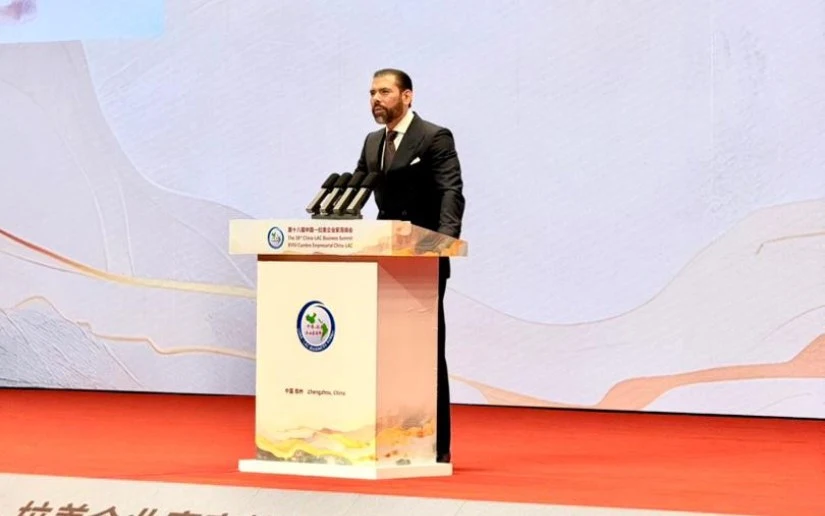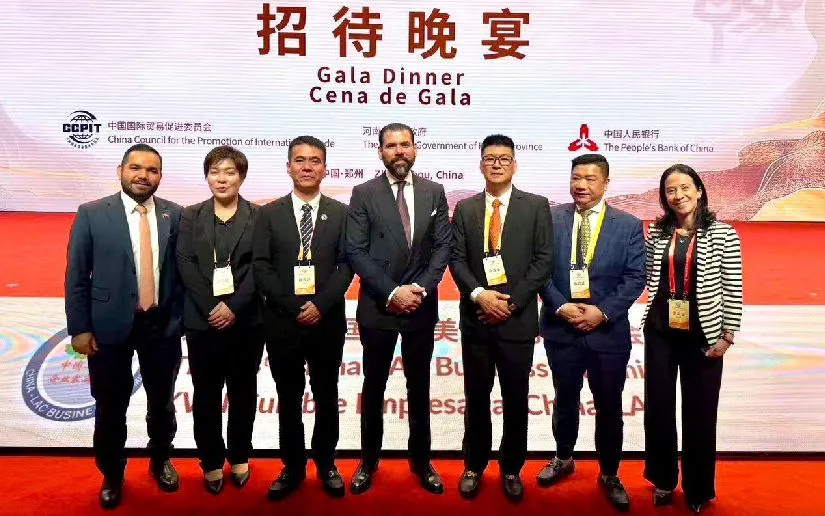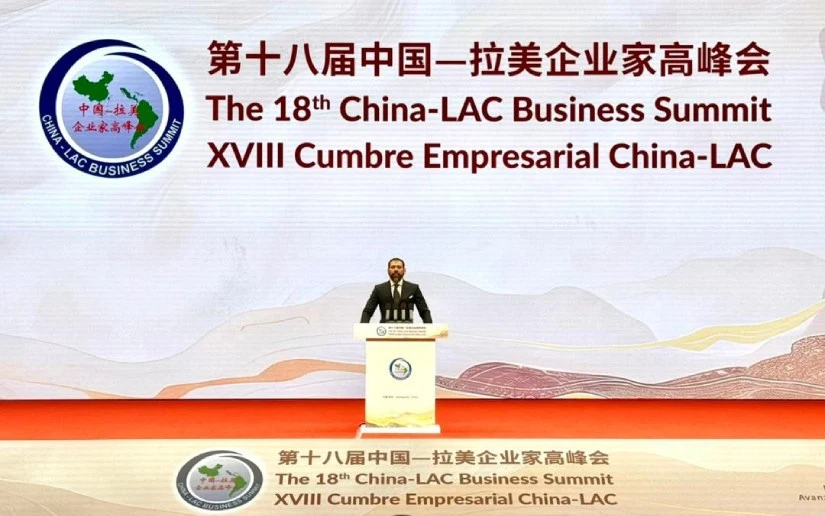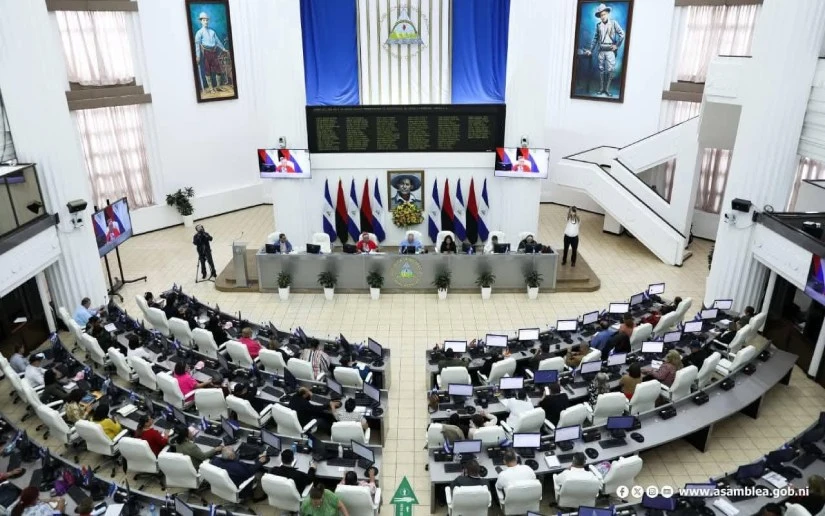New Maritime Trade Route Between Nicaragua and China Further Strengthens Economic and Commercial Ties
Recently, the first direct maritime trade route between Nicaragua and China was inaugurated, marking a significant milestone in the economic relations between the two countries. This new connection has raised important questions about its impact on bilateral trade and economy. To explore these topics, the Revista En Vivo con Alberto Mora on Canal 4 featured guests such as Laureano Ortega Murillo, Presidential Advisor for Investments and Trade; Zhou Yi, Minister Counsellor of the Chinese Embassy in Nicaragua; General (Ret.) Oscar Mojica, Minister of Transport and Infrastructure; and Maricruz Prieto, Director General of Foreign Trade of MIFIC.
Laureano Ortega Murillo described the launch of this route, which took place on August 1st, as "a milestone in the bilateral relationship between Nicaragua and China, a firm step for Nicaragua as it joins the Belt and Road Initiative." This initiative, launched by President Xi Jinping 10 years ago, aims to connect people through trade and logistics. Nicaragua joined it in January 2022. Since then, the country has been making progress in strengthening its economic and commercial ties with China.
Ortega Murillo highlighted the specific benefits of the new route, emphasizing that "the predictability of shipment arrival and departure times and the savings in time are crucial. Before the opening of this direct route, ships could take between 45 days and two months to complete the journey, making multiple stops at other ports. Now, with the new route, the estimated travel time is 30 days. In business, as entrepreneurs say, time is money, and this time saving will generate substantial benefits for import and export operations."
The presidential advisor expressed his gratitude "to the government of the People's Republic of China, President Xi Jinping first and foremost, the Communist Party of China, its government, and its people for the high attention and priority they have given to this relationship with our country." He also highlighted the impact of the joint declaration between President Ortega and President Xi Jinping, which elevated relations between Nicaragua and China to a strategic partnership.
He noted that bilateral cooperation has been strengthened with the signing of agreements, such as the cooperation between the Sandinista National Liberation Front and the Communist Party of China, stating that "our bilateral relationship is precisely based on this historical bond of brotherhood between our parties."
The presidential advisor also compared the dimensions and achievements of China with those of Nicaragua, saying: "China, a vast country in terms of territory and population, with significant technological and scientific advancements, recognizes in Nicaragua a history of courage and defense of sovereignty." He also mentioned that Nicaragua is promoting the arrival of Chinese entrepreneurs to establish regional operational centers, benefiting from "all the incentives and facilities provided by our government" and the "very open legal framework to attract new investments."
"And here we are united, and despite those proportional differences, China recognizes in Nicaragua this history of courage, of defending our sovereignty, of a system that we have been developing with our Sandinista National Liberation Front for the good of our people. China also recognizes the high potential Nicaragua has as a regional and global platform for trade, to develop more projects, and as we have been promoting, for Chinese entrepreneurs and companies to come and establish their regional operational centers in Nicaragua. From Nicaragua, with all the incentives and facilities provided by our government, the legal framework our country has, which is very open to attracting new investments, with extraordinary benefits still offered by our legal framework, we have been encouraging the creation of associations and business chambers of Chinese citizens in our country. This has strengthened ties further, and we have seen this concretely with the establishment of Chinese businesses in our country, the development of private investment projects, and the involvement of Chinese companies in major transformative projects—projects in infrastructure, energy, water, and sanitation—that are strategic for our country's development, which are state-owned, and we have the participation of Chinese companies, including in the communications sector where we are cooperating with Chinese companies," he emphasized.
Ortega Murillo highlighted that the opening of the maritime route represents "a new horizon to further enhance economic and commercial ties." He underscored achievements made in record time, such as the Free Trade Agreement signed in August last year, which came into effect on January 1st of this year, and the phytosanitary agreements that allow Nicaraguan products to be exported to the Chinese market.
He concluded by saying that the efforts in this short period are "achievements for which we must thank God, thank the efforts of our government, and the attention and priority that the government of the People's Republic of China is giving us."
A Strategic Advance for the Country
For his part, General (Ret.) Oscar Mojica, Minister of Transport and Infrastructure, emphasized the importance of this new connection for Nicaragua's future, highlighting the fundamental role of President Commander Daniel Ortega and Vice President Comrade Rosario Murillo in its realization.
"This effort has brought with it a new maritime route between Tianjin and Corinto," stated General Mojica, highlighting that this connection contributes to "strengthening peace, stability, promoting creative work, enhancing security, and consolidating stability, prosperity, and the expansion of trade and well-being for both Chinese and Nicaraguan families."
Mojica explained that the new route has "enormous significance" as it marks "a fundamental milestone in our economic and commercial relations." This route, which reduces the travel time from 45-60 days to just 30 days, represents "a substantial time saving" and a reduction in transportation costs.
According to General Mojica, "every day, a ship costs thousands of dollars," so this saving will "strengthen the competitiveness of our export products in the international market."
Additionally, Mojica pointed out that Nicaragua's advancement as a commercial platform for transportation and logistics is complemented by the new international airport project, Punta Huete. This 4F category airport will have the capacity to receive 3.5 million passengers per year, facilitating direct flights from "the most distant latitudes and regions of the world."
This development takes place within a context of continuous economic growth for Nicaragua, with a growth rate of 4.6% over the last decade. "This signifies a tremendous advance in our economic relations and in all aspects with the rest of the world," affirmed Mojica, who also emphasized the importance of attracting investors to the country by taking advantage of the favorable conditions offered by the government.
General Mojica emphasized Nicaragua's strategic location in the heart of the Americas and how Corinto is set to become a "major hub of maritime trade." With significant investments in the Port of Corinto, including the remodeling of 165,000 square meters and the construction of a new multipurpose dock, a bulk cargo dock, and a modern logistics center, the port will be prepared to handle "80 million tons of merchandise per year."
Mojica emphasized that Nicaragua is ready to take advantage of "those strengths that nature has placed in our hands to enhance the development of the Nicaraguan nation. In addition, the country's commitment to the expansion and strengthening of its international trade relations."
Opportunities of the New Maritime Route with China
The recent inauguration of the first direct maritime trade route between Nicaragua and China promises to transform the landscape of bilateral trade, according to Maricruz Prieto, Director General of Foreign Trade at MIFIC.
"The route is part of a global effort to facilitate trade, which translates into lower freight costs, and therefore lower costs for goods. This will allow the people of both countries to access quality products at reduced prices, benefiting from the growth in trade driven by the Free Trade Agreement between Nicaragua and China," said Prieto.
Prieto also highlighted that the new route offers "a stable platform" that is especially valuable in the context of current international crises, such as climate change and the container crisis. According to Prieto, "this direct maritime route will ensure that our products are exchanged quickly and that trade flows more rapidly between both countries."
The Director General of Foreign Trade illustrated the positive impact of the new route with concrete data: "We can see in the trade exchange, if we compare Nicaragua's exports in the first half of this year 2024, growing by 80.1 percent compared to the exports that Nicaragua made last year to China."
Furthermore, she pointed out that sugar has emerged as the main product exported to China, representing 60 percent of exports. "We even have a quota within the treaty of 50,000 tons with a reference tariff," Prieto mentioned. But she highlighted that Nicaragua has exported more than 70,000 tons in July of this year, indicating that "our product is competitive in the Chinese market."
Prieto also highlighted the achievements in beef exports, which began in February thanks to a 0 percent tariff under the Free Trade Agreement. The sanitary protocol for meat and seafood was quickly negotiated, allowing Nicaragua to access this vast market. Prieto noted that "our producers face a significant challenge to produce more, produce better, and with higher quality" to meet the demands of the Chinese market.
She emphasized the opportunities to attract investments that the treaty offers. She mentioned that the country is working to develop its productivity and generate more added value for products like coffee and cocoa. "We want to produce coffee with greater added value, stop exporting raw cocoa beans, and process that cocoa," explained Prieto, who also highlighted efforts in the export of oils and other products.
In this regard, she noted that although the Chinese market presents significant demands, both phytosanitary and in labeling, "we know that with the support of the government and the institutions that are open to addressing all the concerns and needs that producers may have," Nicaragua can overcome these challenges and take advantage of the benefits of the Chinese market.
Impact of the New Route on China-Nicaragua Relations
Since the reestablishment of diplomatic relations between China and Nicaragua, exchanges and cooperation between the two countries have advanced remarkably quickly. Zhou Yi, Minister Counsellor of the Chinese Embassy in Nicaragua, highlighted that this development has yielded significant cooperation results, based on "shared gains and mutual benefit."
According to Zhou, the recent opening of the first direct maritime route between the two countries represents a crucial step in fostering trade exchanges and revitalizing the development of both nations.
"The opening of this maritime route will foster trade exchanges between the two countries and inject new vigor into each country's development," said Zhou. He also emphasized that the Free Trade Agreement between China and Nicaragua, which came into effect in January this year, has opened "new horizons and bright futures for the expansion of bilateral trade cooperation."
Zhou Yi also addressed how to maximize the benefits of the Free Trade Agreement (FTA) for businesses and the people of both countries. "How can we leverage the dividends of the FTA and bring visible and tangible benefits to the businesses and people of both countries?" asked the diplomat. In response to this question, he emphasized the need for greater effort from entrepreneurs and continued support from both governments. "Both governments are identifying communications and coordination between departments to align market access requirements and policies," Zhou explained.
He also mentioned the importance of "intensifying media publicity so that companies can closely understand the characteristics of each other's markets and competitive products" and "expanding and exploring more channels, such as the new maritime route," to reduce trade costs and promote more cooperation.
The minister counsellor also expressed his hope that the opening of this new maritime route would be a "new starting point" for expanding the air and sea transportation network between the two countries. "We hope that with this maritime opening as a new starting point, the air and sea transportation network between both countries will be further expanded, and connectivity will be accelerated in order to build a path of prosperity and economic cooperation between China and Nicaragua," Zhou affirmed.
China, which continues to be one of the world's leading economies, has seen significant growth. In the first half of the year, China's GDP approached $8.7 trillion, with an annual increase of 5 percent. The country also attracted approximately $70 billion in foreign direct investment. Zhou Yi highlighted that these achievements place China in the "front ranks of the world's major economies." He also mentioned the importance of the recent third session of the Central Committee of the Communist Party of China, which proposed more than 300 reform measures and a clear signal to "expand high-level openness to the outside world."
Zhou reiterated China's willingness to share development opportunities with other countries, including Nicaragua, and to foster comprehensive cooperation in the industrial and supply chains. "We are willing to share development opportunities with other countries in the world, including Nicaragua, by promoting comprehensive cooperation in the industrial and supply chains in order to make the economic openness pie bigger and lengthen the list of cooperations," assured Zhou Yi.
This approach aims to contribute to the building of a "community with a shared future for humanity" through closer and more beneficial international collaboration.
Impact of the Free Trade Agreement
Comrade Laureano Ortega Murillo, presidential advisor for investments and trade, shared valuable insights on the recent Free Trade Agreement (FTA) between Nicaragua and China and the new direct maritime route that has begun operating.
He highlighted the "strong start" that the Nicaraguan market has had since the agreement took effect, stating that "without a doubt, this is a new market for Nicaragua." According to Ortega Murillo, the Minister of Industry and Trade, Jesús Bermúdez, had indicated that "new markets, when an agreement or treaty is signed, can take 3 to 5 years to reach the figures we have achieved in six months of operation." This quick start shows that Nicaragua is beginning with "a strong, firm footing."
Ortega Murillo also emphasized the importance of Nicaragua’s participation in the China Import Expo, the largest in the world, thanks to the efforts of the Chinese embassy in Nicaragua. "We must not forget that thanks to the efforts of the Chinese embassy in Nicaragua, we have had the opportunity to participate twice already in the China Import Expo," he noted. The expo, held every October in Shanghai, has allowed Nicaragua to showcase its products and foster interest among Nicaraguan entrepreneurs in the Chinese market, which "is the market of the present and future for Nicaraguan products."
To further promote this exchange, Ortega Murillo announced the visit of a Chinese business delegation in August, composed of approximately 30 entrepreneurs. These entrepreneurs will participate in a business forum in Nicaragua, sign contracts for key products such as shrimp, lobster, and coffee, and explore co-investment opportunities in the country. "We will promote co-investments in Nicaragua," stated Ortega Murillo, highlighting that Chinese entrepreneurs can take advantage of the "vast areas of land available for cultivation" and establish business alliances with Nicaraguan cooperatives and exporters. This collaboration aims to make both countries regional platforms for trade.
Additionally, Comrade Laureano announced that the China-Latin America Business Summit will be held in Nicaragua in November, providing an additional opportunity to strengthen trade ties and leverage the opening of the new maritime route. "These will be three extremely important moments to make the most of the opening of this direct maritime route between our countries," he expressed. Regarding the operation of the maritime route, he mentioned that currently, one ship per month is secured, but it is expected that up to three ships will operate in the future, providing greater security and expanding trade exchange.
He referred to the symbolic significance of the relationship between Nicaragua and China, recalling the signing of the reestablishment of diplomatic relations in Tianjin on December 9, 2021. "It is from Tianjin that the ship sailed directly to Nicaragua," he said. This direct connection represents a significant advancement in the bilateral relationship, with the goal of "eradicating extreme poverty" and improving living conditions in Nicaragua through job creation, investments, and support for rural production, as well as the health and education sectors.
He affirmed that Nicaragua, "hand in hand with our brothers from the People's Republic of China," is on a path of "prosperity, well-being, and benefits for our people."
Key Infrastructure Projects with China’s Support
Retired General Oscar Mojica, Nicaragua's Minister of Transportation and Infrastructure, highlighted recent advancements in the country’s infrastructure, emphasizing the crucial role that the Sandinista government is playing in realizing important projects.
Mojica stressed that the government "speaks with actions, with accomplishments, with realities," and mentioned the recent arrival of construction machinery and equipment from the People’s Republic of China.
"Twenty-three heavy equipment and machinery units have arrived to immediately begin construction on the new Punta Huete International Airport," announced Mojica. This project marks a "historic milestone" as it is the first time in 60 years that Nicaragua is undertaking the construction of a new airport with "extraordinary features" designed to connect the country with any region of the world.
The new airport will be a "first-class international airport, likely the largest in Central America." It will have a 3,600-meter-long runway and will be equipped to accommodate the largest aircraft currently operating in the global aviation market. This airport will be classified as "Category 4F," ensuring it meets all necessary conditions to operate high-capacity flights.
Mojica also emphasized that strengthening international connectivity is part of Nicaragua's integration into the "Belt and Road Initiative" promoted by the President of the People's Republic of China, Xi Jinping. "We are providing these great facilities for international connectivity, trade, investment, economic development, transportation, and logistics," stated the Minister.
In addition to this project, Mojica revealed that progress is being made in planning the new port of Bluefields, another significant government project. "We are on the verge of finalizing the detailed plans for the construction of the new port of Bluefields," he said. According to Mojica, this port will offer "great opportunities for Nicaragua" by simplifying access to international markets. "It will no longer be necessary to navigate through complicated maritime routes to reach the Greater Caribbean or the major markets of the world," he said. The new port will allow Nicaragua to export directly to South America, North America, the Greater Caribbean, and Europe.
The Minister highlighted Nicaragua's enormous potential, emphasizing that the Government of National Reconciliation and Unity is "turning those potential capacities" into reality. Mojica expressed confidence that these mega-projects will have a "tremendous impact on Nicaragua's economic and social development" and will generate thousands of jobs. The projects will contribute to the modernization of productive processes and strengthen the country's ability to compete in the international market, consolidating Nicaragua as one of the strongest economies in the Central American region.
Workshops for Producers and Exporters
Maricruz Prieto, Director General of Foreign Trade at MIFIC, highlighted the efforts of the Nicaraguan Government to maximize the benefits of the Free Trade Agreement (FTA) with China. Since the agreement came into effect, the government has organized a series of workshops aimed at producers and exporters to inform them about the opportunities the treaty offers. Prieto indicated that "every day, we receive inquiries from producers and exporters at the Ministry of Development, Industry, and Trade about how to access the Chinese market and how to take advantage of import opportunities."
Prieto also mentioned the growing interest in importing products from China, which were previously sourced from other markets or subject to tariffs. With the FTA, many of these products can now enter the Nicaraguan market without paying tariffs or with a significant reduction in them. "There are many rules to follow within the treaty, and we are open to all those interested in doing business between Nicaragua and China," she added.
This proactive approach aims to facilitate the integration of Nicaraguan products into the Chinese market and optimize the benefits of the treaty for both countries.
Comrade Laureano Ortega Murillo highlighted the progress of joint projects with companies from the People's Republic of China, emphasizing that significant initiatives are being developed in various sectors. "We are working on road infrastructure projects, renewable energy projects, telecommunications technology projects, water and sanitation projects, and hospitals for our people. We are covering a wide range of sectors that will benefit our people while also providing the facilities for better infrastructure in terms of trade, logistics, and regional competitiveness. This will give us greater opportunities to export our products to global markets, especially to the market of the People's Republic of China."
Ortega Murillo also emphasized the importance of approaching new markets to take advantage of the benefits of existing agreements and treaties. "We want to reiterate to our people that we need to foster engagement with these new markets to gain access to all the benefits we are making available through the agreements and treaties we have been signing. Any necessary information to maximize these benefits is available at our Ministry of Industry and Trade, as well as at the Secretariat of Investments and Exports. We must all join this national effort, working for our development, our future, and our prosperity."
For his part, Zhou Yi, Minister Counselor of the Embassy of China in Nicaragua, emphasized the importance of cooperation between the two countries. "Cooperation between China and Nicaragua is very important because Nicaragua is a great country. China pays close attention to promoting cooperation in all areas with this beautiful and friendly country. China insists on external openness, and we always want to strengthen ties and expand cooperation even further on the basis of shared gains and mutual benefit with Nicaragua and other friendly countries, to build a world of lasting peace and prosperity."
Source: 19 Digital




